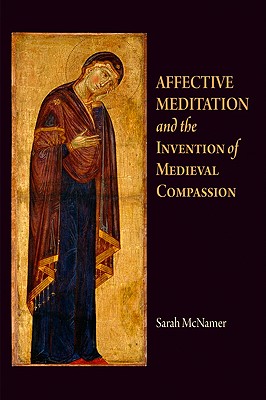Affective Meditation and the Invention of Medieval Compassion

Affective Meditation and the Invention of Medieval Compassion
Affective meditation on the Passion was one of the most popular literary genres of the high and later Middle Ages. Proliferating in a rich variety of forms, these lyrical, impassioned, script-like texts in Latin and the vernacular had a deceptively simple goal: to teach their readers how to feel. They were thus instrumental in shaping and sustaining the wide-scale shift in medieval Christian sensibility from fear of God to compassion for the suffering Christ.
Affective Meditation and the Invention of Medieval Compassion advances a new narrative for this broad cultural change and the meditative writings that both generated and reflected it. Sarah McNamer locates women as agents in the creation of the earliest and most influential texts in the genre, from John of Fécamp's Libellus to the Meditationes Vitae Christi, thus challenging current paradigms that cast the compassionate affective mode as Anselmian or Franciscan in origin. The early development of the genre in women's practices had a powerful and lasting legacy. With special attention to Middle English texts, including Nicholas Love's Mirror and a wide range of Passion lyrics and laments, Affective Meditation and the Invention of Medieval Compassion illuminates how these scripts for the performance of prayer served to construct compassion itself as an intimate and feminine emotion. To feel compassion for Christ, in the private drama of the heart that these texts stage, was to feel like a woman. This was an assumption about emotion that proved historically consequential, McNamer demonstrates, as she traces some of its legal, ethical, and social functions in late medieval England.
PRP: 658.31 Lei
Acesta este Pretul Recomandat de Producator. Pretul de vanzare al produsului este afisat mai jos.
526.65Lei
526.65Lei
658.31 LeiLivrare in 2-4 saptamani
Descrierea produsului
Affective meditation on the Passion was one of the most popular literary genres of the high and later Middle Ages. Proliferating in a rich variety of forms, these lyrical, impassioned, script-like texts in Latin and the vernacular had a deceptively simple goal: to teach their readers how to feel. They were thus instrumental in shaping and sustaining the wide-scale shift in medieval Christian sensibility from fear of God to compassion for the suffering Christ.
Affective Meditation and the Invention of Medieval Compassion advances a new narrative for this broad cultural change and the meditative writings that both generated and reflected it. Sarah McNamer locates women as agents in the creation of the earliest and most influential texts in the genre, from John of Fécamp's Libellus to the Meditationes Vitae Christi, thus challenging current paradigms that cast the compassionate affective mode as Anselmian or Franciscan in origin. The early development of the genre in women's practices had a powerful and lasting legacy. With special attention to Middle English texts, including Nicholas Love's Mirror and a wide range of Passion lyrics and laments, Affective Meditation and the Invention of Medieval Compassion illuminates how these scripts for the performance of prayer served to construct compassion itself as an intimate and feminine emotion. To feel compassion for Christ, in the private drama of the heart that these texts stage, was to feel like a woman. This was an assumption about emotion that proved historically consequential, McNamer demonstrates, as she traces some of its legal, ethical, and social functions in late medieval England.
Detaliile produsului








